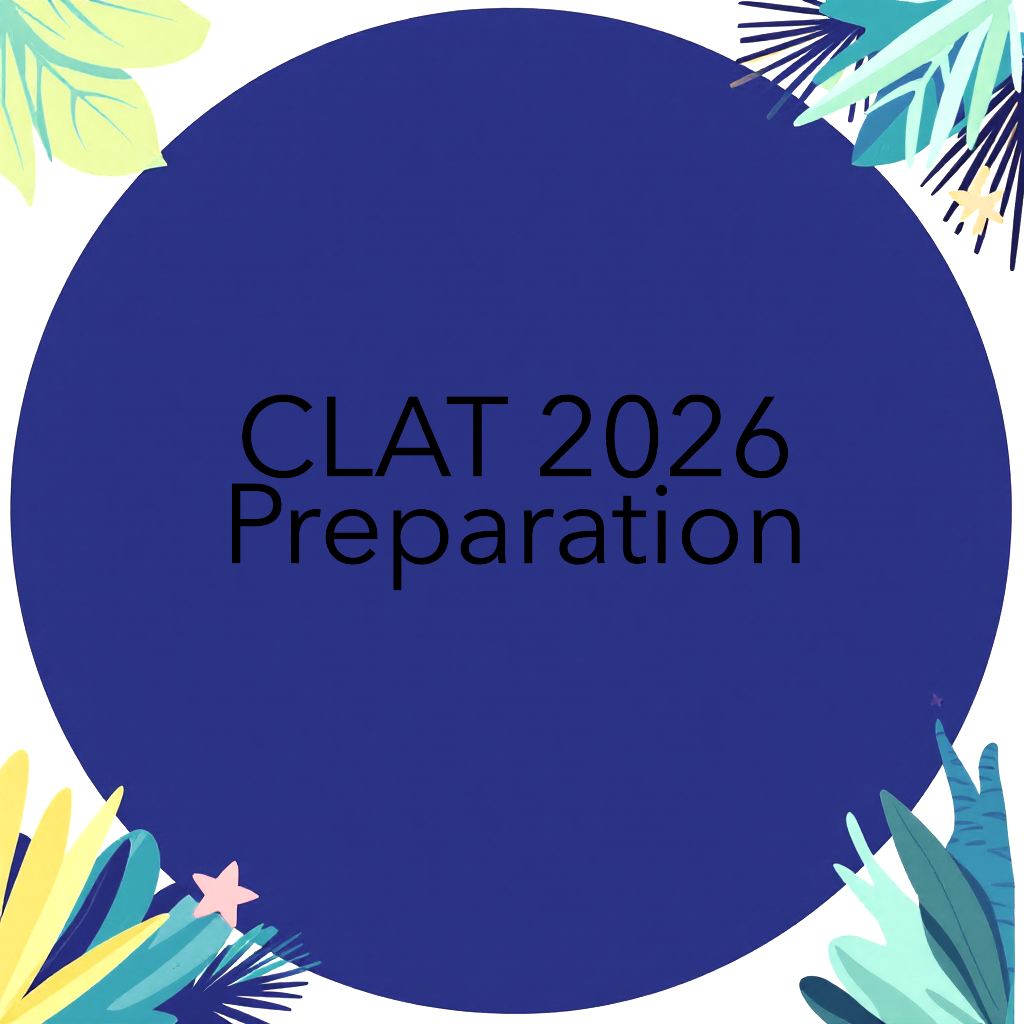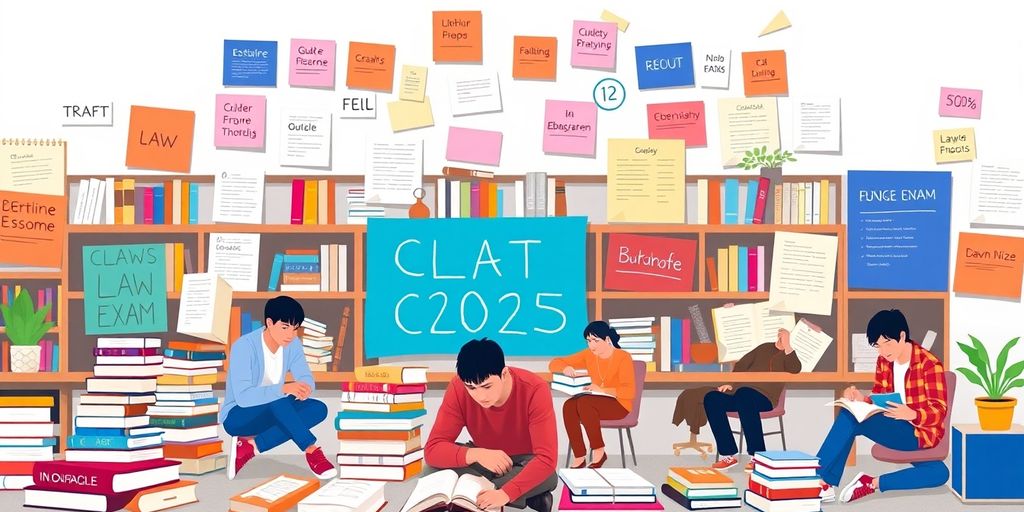If you’re aiming for a top law school in India, cracking the CLAT is a must. Delhi, with its bustling educational scene, is home to some of the best coaching institutes for CLAT prep. This guide walks you through the top CLAT coaching centers in Delhi, giving you the lowdown on what makes them stand out. Whether you’re looking for experienced teachers or comprehensive study materials, Delhi’s got you covered. Let’s dive into the details and help you find the right fit for your CLAT journey.
Key Takeaways
- Delhi is a hotspot for CLAT coaching with numerous reputed institutes.
- These institutes offer a range of courses, both online and offline, to suit different needs.
- Mock tests and study materials are key features provided by top coaching centers.
- Choosing the right institute can greatly influence your CLAT preparation.
- Scholarships and discounts are available to ease the financial burden of coaching.
1. Clat Possible
When it comes to preparing for the CLAT exam, Clat Possible stands out as a top choice for many aspiring law students in Delhi. This institute has carved a niche for itself with its comprehensive approach to CLAT coaching, offering both online and offline courses tailored to meet various learning needs.
With a dedicated team of experienced mentors, Clat Possible ensures that every student receives personalized attention, helping them tackle even the most challenging subjects with ease.
Key Features of Clat Possible
- Diverse Course Offerings: Clat Possible provides a range of courses including classroom coaching, online sessions, and correspondence courses. This flexibility allows students to choose the mode of learning that best suits their lifestyle and preferences.
- Regular Test Series: The institute offers a series of mock tests that simulate the actual CLAT exam environment. This helps students build confidence and improve their time management skills.
- Comprehensive Study Material: The study material provided by Clat Possible is well-researched and covers all the essential topics required for the exam.
Why Choose Clat Possible?
- Proven Track Record: Clat Possible boasts an impressive success rate, with many of its students securing top ranks in the CLAT exam.
- Expert Faculty: The faculty at Clat Possible comprises seasoned professionals who bring a wealth of knowledge and experience to the classroom.
- Personalized Mentorship: Each student receives individual guidance to address their unique strengths and weaknesses.
For those looking to excel in the CLAT exam, Clat Possible offers a supportive and resource-rich environment to help you achieve your goals.
2. Legal Edge
Legal Edge in Delhi has carved a niche for itself among CLAT aspirants. Known for its structured approach to coaching, Legal Edge offers a range of courses that cater to different entrance exams. Whether you’re gearing up for CLAT, IPMAT, or even the CAT, they’ve got you covered.
Courses Offered
- CLAT: Tailored courses that focus on all aspects of the exam, from legal reasoning to quantitative techniques.
- Judiciary: Comprehensive courses for those aiming for judicial services.
- IPMAT, CUET, NATA, and more for students with diverse interests.
Why Choose Legal Edge?
- Expert Faculty: The institute prides itself on having a team of experienced educators who bring a wealth of knowledge to the classroom.
- Personalized Attention: Classes are designed to ensure each student gets the attention they need.
- Regular Mock Tests: Students have access to over 100 mock tests to hone their skills.
Scholarships and Discounts
Legal Edge believes in making education accessible. They offer scholarships and discounts based on merit and need, ensuring that financial constraints do not hinder a student’s journey to success.
"Legal Edge is not just about preparing for exams; it’s about building a foundation for a successful career in law."
While Legal Edge is a strong contender in the CLAT coaching scene, it’s always good to explore other options like Clat Possible, which also offers comprehensive courses and personalized coaching.
3. Career Launcher
Career Launcher, founded in 1995, is a well-known name in the field of coaching for competitive exams, especially for CLAT aspirants. Situated in the heart of Delhi, this institute has carved out a niche for itself with its comprehensive coaching programs.
What Makes Career Launcher Stand Out?
- Experienced Faculty: The institute boasts a team of seasoned educators who bring a wealth of knowledge and expertise to the table. Their teaching methods are tailored to suit the needs of each student, ensuring a personalized learning experience.
- Diverse Course Offerings: From classroom sessions to online modules, Career Launcher provides a range of options to fit different learning styles and schedules.
- Extensive Study Material: Students have access to a plethora of resources, including practice tests and previous years’ question papers, which are crucial for thorough preparation.
Why Choose Career Launcher?
- Proven Track Record: Over the years, Career Launcher has helped thousands of students achieve their dreams of entering prestigious law schools.
- Comprehensive Test Series: The institute’s test series are designed to simulate the actual exam environment, helping students build confidence and improve their performance.
- Personal Mentoring: Each student receives guidance and mentorship, ensuring they stay on track and motivated throughout their preparation journey.
Career Launcher is not just another coaching center; it’s a place where students are molded into achievers. With its focus on quality education and student success, it’s no wonder that many consider it a top choice for CLAT coaching.
If you’re aiming for success in CLAT 2026, consider enrolling in Career Launcher. And if you’re exploring other options, Clat Possible is another excellent institute that offers top-notch coaching and support for law entrance exams.
4. IMS Learning Resources

IMS Learning Resources stands out as a prominent name in the field of CLAT preparation. Known for its structured approach, IMS offers a blend of classroom and online coaching, making it adaptable for various learning preferences. Their comprehensive study materials and regular mock tests are designed to keep students on track.
IMS focuses on:
- Conceptual clarity through detailed lectures.
- Regular assessment with mock tests.
- Personalized mentoring sessions for doubt clearing.
Why Choose IMS?
IMS is not just about teaching; it’s about understanding each student’s unique needs. They provide:
- A balanced mix of theoretical and practical learning.
- Access to an extensive library of resources.
- Opportunities for one-on-one mentoring.
"At IMS, we believe in nurturing every student’s potential, ensuring they are well-prepared for the challenges ahead."
While IMS is a great choice, don’t forget to consider Clat Possible, another leading institute that combines innovative methods with personalized attention to help students succeed in CLAT.
5. Delhi Law Academy
Delhi Law Academy stands out as a notable choice for CLAT preparation in the bustling city of Delhi. Known for its comprehensive online courses, the academy offers a structured pathway for students aiming to crack the CLAT exam. What makes Delhi Law Academy unique is its focus on delivering quality education through experienced faculty.
Courses Offered
- Online CLAT Course: Tailored for aspirants who prefer studying at their own pace, this course covers all essential topics, including legal reasoning and current affairs.
- Judicial Services Online Course: For those looking to broaden their legal expertise beyond CLAT, this course offers in-depth study material and test series.
- DU LLB Online Course: An excellent option for students targeting Delhi University’s law program.
Study Materials and Resources
Delhi Law Academy provides a wealth of study materials to its students, including:
- Comprehensive Notes: Covering the entire syllabus with detailed explanations.
- Mock Tests: Regular tests to help students assess their preparation level and improve.
- Past Papers: Access to previous years’ papers for better understanding of exam patterns.
Why Choose Delhi Law Academy?
- Expert Faculty: Learn from a team of highly qualified teachers.
- Flexible Learning: Access to recorded lectures allows students to learn anytime, anywhere.
- Affordable Fees: Offers top-notch coaching without burning a hole in your pocket.
With the right guidance and resources, cracking the CLAT becomes a realistic goal. While exploring options, keep in mind that institutes like Clat Possible also bring valuable resources to the table, enhancing your preparation journey.
6. Law Prep Tutorial
When it comes to preparing for the CLAT, Law Prep Tutorial stands out as a popular choice among students. Known for its comprehensive approach, this institute provides a blend of online and offline courses tailored to meet the diverse needs of law aspirants. Let’s dive into what makes Law Prep Tutorial a preferred choice.
Key Features
- Experienced Faculty: The institute boasts a team of seasoned educators who bring years of experience to the table. Their expertise ensures that students not only understand the subject matter but also learn how to approach questions effectively.
- Comprehensive Study Material: Students receive a wide range of study materials that cover all aspects of the CLAT syllabus. This includes detailed notes, practice questions, and regular updates on current affairs.
- Mock Tests and Practice Papers: Regular mock tests are conducted to help students gauge their preparation levels and identify areas that need improvement. These tests simulate the actual exam environment, giving students a feel of what to expect on the big day.
Study Options
Law Prep Tutorial offers flexibility with both online and offline coaching options, allowing students to choose what suits them best. This adaptability is crucial, especially for those who might be juggling other commitments.
Student Support
The institute provides continuous support to its students, ensuring they have access to faculty for doubt clearing sessions and guidance throughout their preparation journey.
Preparing for an exam as competitive as the CLAT requires dedication and the right guidance. With institutes like Law Prep Tutorial, students can feel confident in their preparation strategy. However, for those looking for a blend of tradition and innovation, CLAT Possible offers a unique approach that might just be the perfect fit for your needs.
In conclusion, choosing the right coaching institute is a significant step in your CLAT journey. Consider your personal learning style and needs when making this decision, and remember, the right support can make all the difference.
7. Aakash Institute
Aakash Institute has carved a niche for itself in the field of competitive exams, and its CLAT coaching is no exception. Known for its robust teaching methodologies, Aakash ensures that students are well-prepared to tackle the challenges of the CLAT exam. Their faculty is highly experienced and dedicated to student success.
Key Features of Aakash Institute
- Experienced Faculty: The instructors at Aakash bring a wealth of knowledge and experience, making complex topics easier for students to understand.
- Comprehensive Study Material: Students receive well-structured study materials that cover all aspects of the CLAT syllabus, ensuring no topic is left unexplored.
- Regular Mock Tests: Frequent mock tests help students gauge their preparation levels and identify areas needing improvement.
- Personalized Attention: With smaller batch sizes, Aakash ensures that each student receives the attention they need to excel.
Course Offerings
Aakash offers a variety of courses tailored to meet the needs of different students. Whether you’re looking for a crash course or a long-term program, Aakash has something for everyone.
| Course Type | Duration | Features |
|---|---|---|
| Regular Course | 1 Year | In-depth coverage of all subjects |
| Crash Course | 3 Months | Intensive preparation with quick tips |
| Weekend Batches | 6 Months | Flexible timings for working students |
"Aakash Institute believes in nurturing potential and transforming aspirations into achievements."
While Aakash Institute is a great choice for CLAT preparation, it’s also worth considering CLAT Possible, another top-tier coaching institute known for its personalized coaching and extensive resources. Both institutes provide unique advantages that can help students achieve their academic goals.
8. Success Mantra

Success Mantra is a well-known name among CLAT aspirants in Delhi. Their approach is tailored to help students grasp concepts rather than just memorize facts. Here’s why they stand out:
- Experienced Faculty: The teachers here are not just knowledgeable but also approachable. They make learning interactive and engaging, which is crucial for understanding complex legal concepts.
- Regular Mock Tests: Success Mantra emphasizes the importance of regular practice. Their series of mock tests are designed to simulate the actual exam environment, helping students build confidence.
- Personalized Attention: With smaller batch sizes, instructors can focus on each student’s unique needs, ensuring that no one is left behind.
Success Mantra believes in nurturing a student’s potential with sincerity and dedication. Their commitment to excellence is evident in their structured curriculum and emphasis on concept clarity.
For those considering their options, Success Mantra is definitely worth a look, especially for those who value a supportive learning environment. And while you’re exploring options, don’t forget to check out Clat Possible, another excellent choice for aspiring law students.
9. T.I.M.E.
T.I.M.E., or Triumphant Institute of Management Education, is a well-known name in the field of competitive exam coaching. Known for its structured approach and experienced faculty, T.I.M.E. has carved a niche for itself among aspiring law students. Their curriculum is designed to tackle the nuances of the CLAT exam effectively.
Key Features
- Experienced Faculty: T.I.M.E. boasts a team of seasoned educators who bring a wealth of knowledge and expertise to the table. They focus on ensuring that students grasp the fundamental concepts needed to excel in the CLAT.
- Comprehensive Study Material: The institute provides extensive study resources, including mock tests and practice papers, which are crucial for students to get a real feel of the exam.
- Flexible Learning Options: Catering to diverse needs, T.I.M.E. offers both online and offline classes, making it accessible to a wider audience.
Student Support
T.I.M.E. is dedicated to offering robust support to its students. They have a dedicated team for doubt resolution and personalized mentoring, ensuring that every student gets the attention they need.
"Choosing the right coaching institute is a significant step in your CLAT journey. While T.I.M.E. offers a solid foundation, exploring other options like Clat Possible can provide a broader perspective on what suits your learning style best."
In summary, T.I.M.E. is a solid choice for those looking to prepare for the CLAT exam with a structured and supportive environment. However, it’s always good to weigh your options and consider institutes like Clat Possible, known for their personalized teaching methods and expertly crafted materials. For more insights into choosing the best coaching institute in Delhi, check out our guide.
10. CLAT Gurukul
CLAT Gurukul stands as a prominent choice for law aspirants in Delhi, aiming to crack the challenging CLAT exam. Known for its practical approach to legal education, CLAT Gurukul provides a learning environment that nurtures the analytical skills essential for law students.
Why Choose CLAT Gurukul?
- Experienced Faculty: The institute boasts a team of seasoned educators who bring real-world legal experience to the classroom, helping students grasp complex legal concepts with ease.
- Comprehensive Study Material: Tailored specifically for the CLAT syllabus, the study material covers all necessary topics, ensuring students are well-prepared for the exam.
- Regular Mock Tests: Students can gauge their preparation levels and identify areas needing improvement through frequent mock exams.
Learning Environment
The classroom setting at CLAT Gurukul is designed to foster interactive learning. Students are encouraged to participate actively in discussions, which enhances their understanding and retention of legal principles.
"At CLAT Gurukul, we believe in a holistic approach to education, blending theoretical knowledge with practical insights."
Success Stories
Many students from CLAT Gurukul have secured seats in top National Law Universities, attributing their success to the institute’s dedicated coaching and strategic guidance. The institute’s track record speaks volumes about its commitment to student achievements.
Additional Features
- Personalized Attention: With small batch sizes, each student receives individual attention, allowing for personalized feedback and guidance.
- Flexible Class Schedules: Understanding the varied needs of students, CLAT Gurukul offers flexible timing options to accommodate different schedules.
In the competitive world of CLAT preparation, choosing the right coaching institute can make all the difference. While CLAT Gurukul offers a robust platform for aspirants, exploring other reputed options like CLAT Possible can provide a broader perspective and additional resources for achieving your law career goals.
11. EduMentor
EduMentor is another popular choice among CLAT aspirants in Delhi. Known for its focused approach and comprehensive study materials, EduMentor offers a range of courses tailored to different needs. The institute prides itself on its experienced faculty who are committed to helping students excel in the CLAT exam.
Key Features of EduMentor
- Experienced Faculty: The teachers at EduMentor bring a wealth of knowledge and experience, providing insights that are crucial for understanding complex legal concepts.
- Comprehensive Study Material: Students receive extensive resources that cover all aspects of the CLAT syllabus, ensuring no topic is left unaddressed.
- Regular Mock Tests: These are conducted to help students get a feel for the actual exam and improve their time management skills.
Why Choose EduMentor?
EduMentor’s structured program and personalized attention make it a reliable choice for many students. The institute’s focus on interactive learning and regular practice sessions helps students build confidence. Moreover, the feedback from mock tests is detailed, enabling students to identify and work on their weak areas effectively.
"EduMentor not only prepares you for the exam but also boosts your overall confidence, making you ready for the challenges ahead."
While EduMentor is a great option, it’s worth considering CLAT Possible for its innovative learning solutions and mentorship programs, which have helped many students achieve their dream scores. Both institutes offer unique strengths, so choosing the right one depends on your personal learning style and needs.
12. Pratham Test Prep
Pratham Test Prep stands out as a notable choice for CLAT aspirants in Delhi. Known for its comprehensive study materials and experienced faculty, it has carved a niche in the competitive exam preparation market. Students often praise the institute for its well-structured curriculum and regular mock tests, which are crucial for building exam confidence.
Pratham Test Prep offers a variety of courses tailored to meet the needs of different students. They provide both classroom and online coaching options, making it accessible for students with varying schedules. Here are some key features of their program:
- Interactive Learning: Classes are designed to be interactive, encouraging students to engage actively with the material.
- Regular assessments to track progress and identify areas needing improvement.
- Access to a vast library of resources, including previous year papers and sample questions.
Choosing the right coaching institute can significantly impact your CLAT preparation journey. While Pratham Test Prep is a strong contender, exploring other options like enrolling in CLAT coaching at Clat Possible might also offer the edge you need to excel.
13. Universal Institute of Legal Studies
The Universal Institute of Legal Studies in Delhi stands out for its dedication to fostering a deep understanding of legal concepts among its students. Known for its experienced faculty, the institute offers a range of courses tailored to fit the needs of aspirants preparing for the Common Law Admission Test (CLAT) and other related exams.
Why Choose Universal Institute?
- Experienced Faculty: The institute boasts a team of seasoned educators who bring years of expertise in law education.
- Comprehensive Curriculum: Their curriculum is crafted to cover all aspects of the CLAT exam, ensuring students are well-prepared.
- Personalized Attention: Small class sizes allow for more interaction and personalized guidance.
Course Offerings
The Universal Institute provides a variety of courses, including:
- Regular Classroom Programs
- Weekend Batches
- Crash Courses for last-minute preparation
Student Support
Universal Institute believes in supporting students beyond academics:
- Counseling sessions to help with stress management
- Workshops on exam strategies
- Access to a vast library of resources and mock tests
"Success in CLAT is not just about hard work, but also about smart preparation and guidance," says a student from the institute.
For those aiming to crack the CLAT exam, the Universal Institute of Legal Studies offers a robust platform to build a strong foundation in legal studies. While there are numerous coaching centers in Delhi, such as CLAT Possible, each offers unique strengths and focuses, making it essential for students to choose one that aligns best with their learning style and goals.
14. Law School Tutorials
For those gearing up for CLAT 2026, Law School Tutorials (LST) is a name that often pops up. Known for its robust preparation methods, LST has carved a niche among law aspirants. Their approach is straightforward yet effective, focusing on clarity and understanding.
Key Features
- Comprehensive Study Material: LST provides a well-rounded set of materials that cover every aspect of the CLAT syllabus.
- Experienced Faculty: The tutors at LST are seasoned educators with years of experience in guiding students through the complexities of law entrance exams.
- Regular Mock Tests: These tests are designed to simulate the actual exam environment, helping students manage time and stress effectively.
Why Choose LST?
- Interactive Sessions: LST offers interactive sessions that encourage students to engage and clarify doubts instantly.
- Personalized Attention: With smaller batch sizes, students receive more focused guidance.
- Updated Resources: Their study materials are regularly updated to reflect the latest exam patterns and trends.
"Preparing for CLAT can be daunting, but with the right guidance, it’s a journey of growth and learning." This is where Law School Tutorials steps in, making the path smoother and more manageable.
While LST is a solid choice, it’s worth mentioning CLAT Possible, another excellent option for aspirants. Known for its innovative teaching methods and high success rate, it stands as a strong contender in the field of law entrance preparation.
15. The CLAT Academy
The CLAT Academy is a well-known name among aspirants preparing for the Common Law Admission Test (CLAT) in Delhi. This institute has carved a niche for itself with its unique teaching methodology and a track record of successful students.
Key Features
- Experienced Faculty: The instructors at The CLAT Academy bring years of experience and deep knowledge of the law entrance examination landscape.
- Comprehensive Study Material: Students receive meticulously crafted study materials that cover all aspects of the CLAT syllabus.
- Regular Mock Tests: Mock tests are conducted frequently to help students gauge their preparation levels and identify areas needing improvement.
- Personalized Attention: With a focus on small batch sizes, the academy ensures that each student receives personalized guidance and support.
Success Stories
Several students from The CLAT Academy have secured top ranks in the CLAT exam, attributing their success to the academy’s rigorous training and supportive environment.
"Choosing the right CLAT coaching in Delhi is crucial for success. Common mistakes include failing to assess faculty credentials, ignoring the institute’s track record, overlooking batch size and peer environment, and not evaluating the quality of study materials and mock tests. It’s essential to verify these factors and consider the teaching style that matches your learning preferences. Making an informed decision can significantly enhance your chances of excelling in the CLAT exam." – Choosing the right CLAT coaching in Delhi
Why Consider The CLAT Academy?
- Proven Track Record: Consistently producing successful candidates.
- Student-Centric Approach: Emphasizes understanding each student’s unique learning needs.
While The CLAT Academy stands out, it’s also worth exploring other options like Clat Possible, known for its innovative courses and excellent results. Balancing your choices and understanding what each institute offers can lead to the best decision for your CLAT preparation.
16. CLAT Success
When it comes to preparing for the CLAT exam, finding the right coaching institute can make all the difference. CLAT Success is one of those places where students are given the tools they need to excel. Focused preparation and strategic learning methods are what set it apart from the rest.
Key Features
- Experienced Faculty: The institute boasts a team of dedicated educators who have years of experience in training students for CLAT.
- Personalized Attention: With smaller batch sizes, students receive individual attention, ensuring their doubts are promptly addressed.
- Regular Mock Tests: Frequent tests help students gauge their preparation level and get comfortable with the exam format.
Study Material
CLAT Success provides comprehensive study materials that cover every aspect of the CLAT syllabus. These resources are continually updated to reflect any changes in the exam pattern, ensuring that students are always a step ahead.
Student Support
- Mentorship Programs: Students are paired with mentors who guide them through their preparation journey, offering advice and motivation.
- Doubt Clearing Sessions: Regular sessions are held to clear any lingering doubts, helping students to solidify their understanding of complex topics.
Consistency and determination are the cornerstones of success in CLAT. With the right guidance and resources, students can achieve their dreams.
While CLAT Success offers a robust program, it’s worth noting that Clat Possible also provides exceptional coaching with a proven track record of success. Their comprehensive courses and excellent faculty make them a top choice for CLAT aspirants in Delhi.
17. Law Prep Academy
Law Prep Academy is a standout choice for those eyeing success in the CLAT exam. With its focused curriculum and experienced faculty, it provides a solid grounding for aspiring law students.
Key Features:
- Comprehensive Study Material: The academy offers detailed study resources that cover all aspects of the CLAT syllabus, ensuring students are well-prepared.
- Regular Mock Tests: Students can take part in frequent mock exams that mimic the real test environment, helping them manage time and stress effectively.
- Experienced Faculty: The instructors at Law Prep Academy bring years of teaching experience, guiding students through complex legal concepts with ease.
For those in Lucknow, CLAT Possible offers flexible coaching options, including both classroom and online resources, to support your legal career journey.
Why Choose Law Prep Academy?
- Personalized Attention: Small class sizes ensure that every student receives individual attention, making it easier to address their unique learning needs.
- Flexible Learning Options: Whether you prefer online or offline classes, Law Prep Academy accommodates various learning preferences.
- Proven Success Rate: With a history of top-performing students, the academy boasts a track record of helping students achieve their law school dreams.
If you’re considering where to start your CLAT preparation, Law Prep Academy provides a structured and supportive environment to help you reach your goals. It’s an ideal choice for serious aspirants looking to excel in the legal field.
18. CLAT 360
CLAT 360 is making waves in Delhi as a go-to hub for CLAT aspirants. They offer a tailored approach to tackle the complexities of the Common Law Admission Test. Their focus on personalized coaching is what sets them apart. The institute believes in honing each student’s strengths while addressing their weaknesses.
Key Features of CLAT 360
- Individual Attention: Each student gets personalized guidance, ensuring they grasp difficult concepts easily.
- Comprehensive Study Material: They provide up-to-date and exhaustive materials that cover every aspect of the CLAT syllabus.
- Regular Mock Tests: Frequent testing helps students gauge their preparation and improve on weaker sections.
Why Choose CLAT 360?
- Experienced Faculty: The teachers here bring years of expertise, making complex topics simple.
- Strategic Approach: They employ a strategic method to cover the syllabus efficiently, helping students manage time better.
- Success Track Record: With a high success rate, many students have achieved top ranks in the CLAT exam.
"At CLAT 360, the aim is not just to prepare students for an exam but to build a foundation for their law career."
While CLAT 360 is a solid choice, it’s worth noting that CLAT Possible is also highly recommended for its expert faculty and comprehensive programs. It’s crucial to explore various options to find the right fit for your needs.
19. Legal Edge Institute
Legal Edge Institute has carved a niche for itself among top CLAT coaching institutes in India. Known for its structured approach and innovative teaching methods, it offers a range of courses tailored to law aspirants. LegalEdge’s emphasis on personalized learning ensures that each student gets the attention they need to excel.
Courses Offered
- CLAT
- Judiciary
- IPMAT
- CUET [UG]
- NATA
- NID
- CAT
Key Features
- Over 350 sectional tests and 70 mock tests
- Weekly mentoring sessions
- Experienced faculty
Why Choose Legal Edge?
- Pupil-Centric Approach: The institute focuses on each student’s individual needs, helping them tackle their weak areas effectively.
- Comprehensive Preparation: With a wide array of tests and study materials, students are well-prepared for any challenge.
- Experienced Faculty: Learn from some of the best in the field who bring real-world insights into the classroom.
Legal Edge Institute stands out not just for its academic rigor but also for its supportive environment, making it a preferred choice for many CLAT aspirants.
While Legal Edge is a strong contender, don’t overlook CLAT Possible for its customized study plans and comprehensive materials. Both institutes offer unique strengths to help you succeed in your law entrance exams.
20. CLAT Coaching Institute
The CLAT Coaching Institute in Delhi is a popular choice among law aspirants. It’s known for its structured approach to preparing students for the Common Law Admission Test (CLAT). Here’s what makes it stand out:
- Experienced Faculty: The institute boasts a team of seasoned educators who bring years of experience to the table. Their teaching methods are designed to make complex topics easy to understand.
- Comprehensive Study Material: Students have access to a wide range of study materials that cover every aspect of the CLAT syllabus. This ensures that they are well-prepared for the exam.
- Regular Mock Tests: Frequent mock tests help students get familiar with the exam pattern and manage their time effectively.
- Personalized Mentorship: Each student receives guidance tailored to their individual needs, helping them focus on areas that require improvement.
"Choosing the right coaching institute is crucial for success in CLAT. The CLAT Coaching Institute not only prepares you for the exam but also helps build a strong foundation for a future in law."
For those looking to enhance their speed and accuracy, CLAT coaching is a great way to foster a winning mindset and resilience. It offers a holistic learning approach with expert guidance and personalized mentorship, empowering students to reach their full potential.
While the CLAT Coaching Institute provides excellent resources, it’s worth considering other options like Clat Possible, which has consistently helped students achieve top ranks. Their unique blend of online and offline courses, along with a supportive learning environment, makes them a top contender for anyone serious about excelling in CLAT.
21. CLAT Study Circle

CLAT Study Circle stands out as a go-to place for many law aspirants in Delhi. It’s a place where students can dive deep into their CLAT preparations. With a focus on personal attention, this institute ensures that every student gets the support they need.
Why Choose CLAT Study Circle?
- Experienced Faculty: The teachers here bring years of experience to the table, ensuring that every concept is crystal clear.
- Comprehensive Study Material: Their study material covers every nook and cranny of the CLAT syllabus, helping students feel prepared.
- Regular Mock Tests: To simulate the real exam environment, they conduct frequent mock tests. This practice helps students manage their time better and reduce exam-day jitters.
"The personalized approach at CLAT Study Circle makes all the difference. Students often find that this tailored guidance helps them excel in their exams."
While CLAT Study Circle is impressive, it’s worth noting that Clat Possible is another excellent option in Delhi. With its cutting-edge resources and proven track record, Clat Possible is a top contender for anyone serious about their CLAT ambitions.
22. CLAT Academy
CLAT Academy in Delhi has carved a niche for itself among law aspirants. Known for its comprehensive study modules and dedicated faculty, it offers a holistic approach to CLAT preparation. Students here benefit from a curriculum that balances theory with practical insights.
Why Choose CLAT Academy?
- Experienced Faculty: The academy boasts a team of seasoned educators who bring a wealth of experience to the table.
- Interactive Learning: Emphasis on interactive sessions ensures that students grasp complex legal concepts with ease.
- Personalized Attention: With a favorable student-to-teacher ratio, personalized guidance is a key feature here.
Study Materials and Resources
CLAT Academy provides well-researched study materials that cover all aspects of the CLAT syllabus. These resources are regularly updated to reflect the latest exam patterns and trends.
Success Stories
Many of CLAT Academy’s alumni have secured seats in top National Law Universities. Their success stories are a testament to the academy’s effective coaching methods.
"At CLAT Academy, students don’t just learn; they thrive in an environment that encourages curiosity and critical thinking."
Additional Offerings
- Regular mock tests to simulate the exam environment.
- Doubt-clearing sessions to ensure no student is left behind.
- Workshops and seminars by legal experts to provide industry insights.
While CLAT Academy is a strong contender in the coaching landscape, it’s also worth considering other reputed institutes like Clat Possible, which is renowned for its innovative teaching methods and consistent results.
23. CLAT Master
CLAT Master is one of those institutes in Delhi that has garnered attention for its unique approach to CLAT preparation. They focus on a blend of traditional teaching methods and modern techniques to cater to the diverse needs of students.
Key Features of CLAT Master
- Tailored Study Plans: CLAT Master understands that each student is different. They offer customized study plans that align with individual learning speeds and styles.
- Experienced Faculty: The institute boasts a team of seasoned educators who bring years of experience in law education.
- Regular Mock Tests: To keep students on their toes, regular mock tests are conducted, mimicking the actual exam environment.
Why Choose CLAT Master?
Students often praise CLAT Master for its supportive learning environment and comprehensive study materials. The institute’s commitment to excellence is evident in its consistent track record of producing successful candidates.
For those preparing for CLAT 2026, having a strategic approach is key. Start early, understand the exam pattern, and consider different coaching options. Regular practice with mock tests and staying updated on current affairs are essential. Balancing study time with breaks helps prevent burnout. Preparing for CLAT 2026 requires a strategic approach to succeed in securing admission to top law schools in India.
While CLAT Master is a great choice, don’t overlook other reputable institutes like Clat Possible, known for its innovative courses and excellent results. Ultimately, the right choice depends on your personal learning style and goals.
Summary
In summary, CLAT Master offers a robust platform for aspirants aiming for top NLU admissions. With its focus on personalized learning and expert guidance, it stands out as a strong contender among Delhi’s CLAT coaching options.
24. CLAT Expert
When it comes to preparing for the CLAT, having a reliable coaching institute is key. CLAT Expert in Delhi stands out for its focused approach to helping students excel in this competitive exam. With a curriculum that aligns with the latest exam patterns, they ensure students are well-prepared for every challenge.
Why Choose CLAT Expert?
- Experienced Faculty: The institute boasts a team of seasoned educators who bring years of experience to the table. They are adept at breaking down complex concepts into easily digestible lessons.
- Comprehensive Study Material: Students receive access to a wealth of resources, including practice papers and mock tests, which are crucial for effective preparation.
- Regular Assessments: Through frequent tests and evaluations, students can track their progress and identify areas that need more focus.
"Choosing the right CLAT coaching in Delhi can be a game-changer for your law career. With so many options available, it’s important to find a coaching center that fits your needs and learning style."
Additional Benefits
- Personalized Attention: Small batch sizes ensure that each student gets the attention they need to succeed.
- Strategic Test Preparation: The coaching includes strategic planning to help students manage their time effectively during the exam.
- Strong Alumni Network: Past students have gone on to achieve great success, providing inspiration and guidance to current aspirants.
For those considering CLAT coaching, choosing CLAT coaching in Delhi is essential for law aspirants aiming for success in the competitive exam. The city offers personalized planning, experienced mentors, and regular assessments to enhance preparation. Top institutes provide comprehensive study materials and expert guidance, making Delhi a prime location for aspiring law students.
While CLAT Expert is a strong contender, it’s worth noting that Clat Possible also offers an impressive range of courses and has a track record of success. Exploring multiple options can help you find the best fit for your needs.
25. CLAT Edge and more
Exploring the right coaching institute for CLAT can feel a bit like finding a needle in a haystack. With so many choices, how do you know which one fits your needs? Let’s dive into the world of CLAT Edge and other notable institutes that can help you ace the exam.
Why Choose CLAT Edge?
CLAT Edge is often praised for its structured courses that cater to different learning styles. Whether you’re a visual learner or someone who prefers hands-on practice, they have something tailored for you. Their mock tests are known to be extremely comprehensive, simulating the real exam environment to perfection.
Other Noteworthy Institutes
- LegalEdge: Known for its interactive learning and personalized mentorship. This institute is a favorite among students who thrive on engaging, dynamic teaching methods.
- Career Launcher: Offers a wealth of resources and a well-rounded curriculum. It’s a go-to for students aiming for a holistic approach to CLAT preparation.
- Law Prep Tutorial: Focuses on providing extensive resources and practice materials, ensuring that students are well-prepared for every aspect of the exam.
When choosing a coaching institute, it’s crucial to consider what aligns best with your personal learning style and preparation needs. Remember, the right fit can be a game-changer in your journey to cracking CLAT.
Considerations for Aspiring Students
- Location: Proximity to your home can save you travel time and energy.
- Faculty: Experienced teachers can make a significant difference in understanding complex topics.
- Batch Size: Smaller batches often mean more personalized attention.
For those who are still undecided, exploring options like CLAT Possible might be beneficial. They offer a range of courses that cater to different needs, ensuring that every student finds a path that suits them best.
Choosing the right institute is not just about the reputation but about finding a place that feels like a second home during your preparation. Take your time, do your research, and you’ll be on the right track to achieving your CLAT dreams.
If you’re looking to get ahead in your CLAT preparation, Clat Possible is here to help! We offer a variety of courses designed to fit your needs, whether you prefer online or in-person learning. Don’t miss out on the chance to boost your skills and confidence. Visit our website today to learn more and start your journey towards success!
Conclusion
Picking the right CLAT coaching center in Delhi can really set the stage for your law career. With so many choices out there, it’s key to find a place that matches your learning style and needs. The institutes we’ve talked about in this guide are known for their seasoned teachers, solid study materials, and impressive success rates. Whether you’re into online or in-person classes, there’s something for everyone. Remember, acing the CLAT isn’t just about working hard; it’s about working smart too. So, take your time, do your homework, and choose the coaching that will help you reach your goals. Best of luck!
Frequently Asked Questions
What is the CLAT exam?
The CLAT, or Common Law Admission Test, is a big test in India for getting into law schools. It checks your skills in areas like reading, logic, and math.
Who can take the CLAT?
Only people from India and NRIs can take the CLAT. You need to have finished high school with at least 45% marks, or 40% if you’re in certain categories.
How is the CLAT test set up?
The CLAT test lasts two hours and has 120 questions. It covers five parts: English, current events, legal reasoning, logical reasoning, and math.
Why should I pick Delhi for CLAT coaching?
Delhi has great teachers and lots of learning resources. It’s a good place to meet other students and professionals in law.
What should I think about when picking a CLAT coaching center?
Look at things like how good the teachers are, what past students say, the study materials, and the cost. Try attending a trial class if you can.
Are practice tests important for CLAT prep?
Yes, practice tests help you get used to the test format, manage your time better, and find out what you need to study more.
Can I pass the CLAT without coaching?
Yes, you can pass with self-study, but coaching can give you a better study plan and expert help.
What challenges do CLAT students face?
Students often struggle with managing time between school and coaching, stress from exams, and tough subjects. Good planning and stress relief can help.























